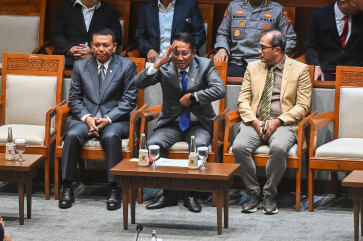Popular Reads
Top Results
Can't find what you're looking for?
View all search resultsPopular Reads
Top Results
Can't find what you're looking for?
View all search resultsEducated workforce sees highest jobless rate: BPS
The Central Statistics Agency (BPS) reported on Wednesday that the most educated section of the Indonesian workforce saw the highest unemployment rate, which underlined a skill mismatch that had long concerned local employers
Change text size
Gift Premium Articles
to Anyone
T
he Central Statistics Agency (BPS) reported on Wednesday that the most educated section of the Indonesian workforce saw the highest unemployment rate, which underlined a skill mismatch that had long concerned local employers.
As of August, the unemployment rate for university graduates stood at 5.6 percent, rising from 5.4 percent a year earlier. In the corresponding period, the unemployment rate for diploma graduates rose to 6.1 percent from 5.9 percent.
Meanwhile, the country saw a fall in the unemployment rate for graduates from elementary, junior high or senior high schools, as companies opted to absorb low-skilled workers when expanding their business.
'Over the year, vocational school, diploma and university graduates have seen an increase in their unemployment rate,' BPS head Suryamin noted.
Suryamin highlighted the high unemployment rate for vocational school graduates, which signaled a skill mismatch between Indonesia's education system and employers' demands.
In the country's workforce structure, the highest unemployment rate could be found in graduates from vocational schools, as 11.2 percent of such graduates failed to secure jobs, according to BPS data.
The lowest unemployment level came from less-educated, elementary school graduates, with only 3 percent of such graduates failing to find jobs.
Overall unemployment in Indonesia stood at 7.2 million, or 5.9 percent of the total workforce, according to BPS data.
Former finance minister Chatib Basri frequently underlined the 'skill mismatch', where many vocational schools and universities produced graduates that were lacking the required skill standards of local companies.
He floated a proposal where companies could be given tax incentives for providing additional education and training to graduates.
'Many universities or vocational schools still produce less-qualified graduates with skills with questionable quality ' we cannot employ them,' said Sofjan Wanandi from the Indonesian Employers Association (Apindo).
'Besides, most good graduates come from the social sciences, while we are still bereft of good graduates from the natural sciences, such as engineers, which industries really need,' he added.
In the banking sector, the demand for qualified workers outstripped supply, as many banks nowadays still encountered difficulties recruiting for mid-level positions, said A. Prasetyantoko, the chief economist of Bank Tabungan Negara (BTN).
'Many banks poach from one another [to meet human resources requirements],' he said by phone on Wednesday.
Prasetyantoko suggested that the government undertake reforms to improve the quality of education and pay attention to non-degree programs, such as certification training, to prevent the skill mismatch from widening.
'JP/ Satria Sambijantoro










